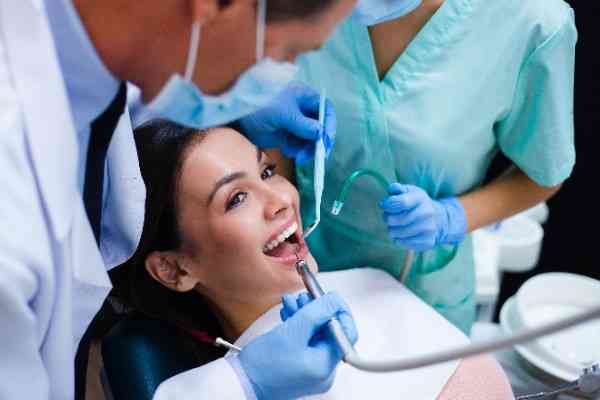It started like any ordinary day. A quick trip to the corner shop. A sudden craving for a sweet, chewy snack. You pick out your favorite toffee bar, unwrapping it with the excitement of childhood memories. But just as you sink your teeth into that sticky indulgence, something doesn’t feel right.
This exact scenario plays out more frequently than you’d think, particularly in towns like Bolton, where chewy snacks are as popular as ever. This blog dives deep into how a simple treat can cause unexpected dental damage, what to do when it happens, and how to prevent it from ruining your smile—and your day.
The Anatomy of a Chewy Snack Disaster
Chewy candies and snacks are uniquely dangerous when it comes to oral health. Their stickiness may be fun for your taste buds, but it’s a nightmare for your teeth. Here’s why:
- Excessive Pressure: These treats often require strong, repeated biting pressure. If there’s already a hairline crack in a tooth, this pressure can cause it to break completely.
- Adhesiveness: Sticky snacks cling to your teeth, increasing the chances of pulling out fillings, crowns, or even implants.
- Hidden Objects: Sometimes snacks contain unexpected hard bits like nuts, unpopped corn kernels, or crystallized sugar clumps that can be the hidden culprit behind a sudden fracture.
Let’s face it: most people don’t pause to assess the risk before indulging in a favorite snack. The reality is that oral injuries caused by such treats aren’t just painful—they’re expensive and inconvenient too.
Immediate Steps After a Dental Injury
If you find yourself in Jane’s shoes—or suspect you’ve cracked or broken a tooth—follow these steps:
- Rinse your mouth with warm water to clear debris and soothe the area.
- Apply a cold compress to your cheek to reduce swelling.
- Avoid chewing on the affected side.
- Preserve the fragment, if any, and bring it to your dentist.
- Contact an emergency dentist immediately.
Even minor chips can escalate quickly, especially when left untreated. Getting professional attention promptly helps avoid more invasive procedures later.

What to Expect During Emergency Dental Treatment
A visit to an emergency dentist usually begins with a visual inspection followed by X-rays. Based on the extent of the damage, treatment options may include:
- Bonding or Fillings: Suitable for small chips and cracks.
- Crowns: For larger fractures where a significant part of the tooth is missing.
- Root Canals: If the tooth’s pulp is exposed or infected.
- Extraction and Replacement: For severe cases that cannot be salvaged.
The best part? Many emergency dental services offer quick diagnostics and same-day treatments to alleviate pain and prevent complications.
If you’re in Bolton, the good news is that local options for an emergency dentist in Bolton are easily accessible, ensuring you don’t have to suffer through the weekend with a damaged tooth.
Prevention Is the Best Cure
While emergencies can’t always be avoided, they can often be minimized with proactive care. Here’s how:
1. Choose Your Snacks Wisely
Avoid extremely chewy or hard treats. Instead, opt for softer alternatives that satisfy your cravings without the risk.
2. Strengthen Your Teeth
Use fluoride-based toothpaste and avoid excessive sugary food to maintain strong enamel.
3. Wear a Mouthguard
If you grind your teeth at night or play contact sports, a custom mouthguard can help prevent fractures.
4. Get Regular Cleanings
Seeing a Hygienist in Wolverhampton or your local area every six months is crucial. Hygienists help spot early signs of decay and weak spots before they become problematic.
5. Replace Fillings Promptly
Old, damaged fillings are ticking time bombs. Replace them at the first sign of wear.
The Link Between Oral Hygiene and Dental Emergencies
You might wonder, “What does a hygienist have to do with broken teeth?”
Plenty.
Neglected plaque and tartar can erode enamel and expose your teeth to cracking more easily. Gums that aren’t in good condition may not hold teeth firmly, making injuries more likely even during simple activities like chewing.
That’s why regular visits to a hygienist in Wolverhampton or your local area can be your first line of defense. They don’t just clean your teeth—they give you tailored guidance and catch signs of damage that could lead to emergencies.
Common Foods That Could Cause Dental Damage
To help you make smarter choices, here’s a list of snacks and foods commonly linked to cracked or broken teeth:
- Hard candies
- Unpopped popcorn kernels
- Caramel and toffee
- Ice (chewing on it)
- Nuts in shells
- Bone-in meats
- Fruit pits (like olives and cherries)
Remember: when in doubt, take small bites or avoid chewing on problem areas.
Psychological and Financial Toll of Dental Emergencies
Beyond the physical discomfort, dental emergencies like broken teeth can take a toll on your mental well-being and finances. Sudden dental bills, missed work, or canceled plans can lead to stress and anxiety.
Insurance may not always cover emergency services, and ignoring the problem usually ends up costing more. A cracked tooth left untreated can evolve into a root canal or an extraction within days.
That’s why prevention, quick action, and access to trusted professionals are key pillars to maintaining oral health.

Conclusion
A chewy snack might seem harmless, but in reality, it can become the root cause of a dental emergency—especially when pre-existing vulnerabilities go unnoticed. Whether you’re in Bolton or anywhere else, being proactive with your dental hygiene and knowing where to find help can make all the difference.
If you ever find yourself facing a dental crisis, don’t delay. Seek expert care from trusted professionals and invest in preventative maintenance through regular hygiene appointments. Prioritizing your smile today can save you from pain—and cost—tomorrow.
For emergency dental care and trusted hygienist services across the UK, EDA Group has you covered.



